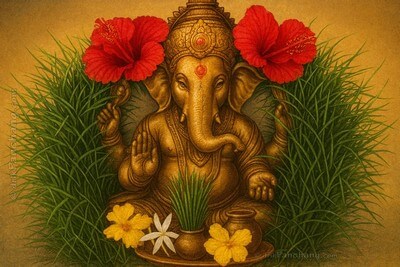






Notes: All timings are represented in 12-hour notation in local time of Lancaster, United States with DST adjustment (if applicable).
Hours which are past midnight are suffixed with next day date. In Panchang day starts and ends with sunrise.
Durvashtami Vrat is observed during Shukla Paksha Ashtami in the month of Bhadrapada. Durva Ashtami Vrat is mainly observed by women. It is considered a highly beneficial and simple fast dedicated to Lord Ganesha, performed to seek His blessings and to remove obstacles from life. Observing this fast with devotion, discipline, and sincerity is believed to grant happiness, peace, progeny and relief from trouble. It is believed that the Durva grass contains qualities of coolness, purity and healing energy.
As per the Vrat Parichaya, on the occasion of Durvashtami, the devotee should perform the Shodashopachara worship of Lord Shiva and Goddess Parvati. Afterwards, they should offer seven types of fruits including Dates, Coconut, Grapes, Wood apple, Orange, Mango, Citron, Pomegranate along with flowers, Durva grass and Naivedya. Observing the fast for the whole day is believed to bring wealth to those desiring wealth, sons to those desiring progeny, and fulfillment of desires to those seeking pleasures.
According to a Puranic legend, during the churning of the ocean, Lord Vishnu assumed the Kurma Avatara and positioned Himself as the pivot for Mount Mandarachal. Due to the rapid rotation of the mountain, friction caused some hair from Lord Vishnu's thighs to fall into the ocean. By the influence of the nectar, these hairs took form on earth as Durva grass. This is why Durva is considered extremely sacred and worshiped on the Durvashtami.